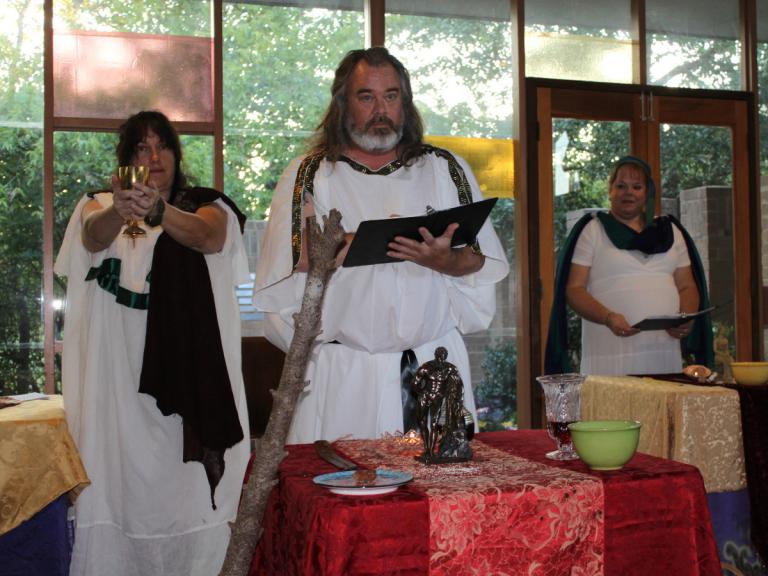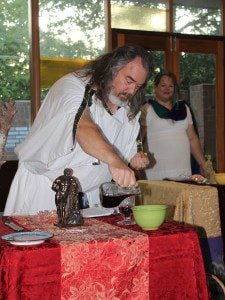 Life in a CUUPS group is never boring. Or at least, it’s never boring when you have a collection of members from a variety of religious backgrounds and callings, representing all four Centers of Paganism, and with a desire to honor and express their traditions within the framework of UU Paganism.
Life in a CUUPS group is never boring. Or at least, it’s never boring when you have a collection of members from a variety of religious backgrounds and callings, representing all four Centers of Paganism, and with a desire to honor and express their traditions within the framework of UU Paganism.
The Denton CUUPS Spring Equinox circle was led by our matriarch who trained in New Thought. I led Beltane – it should surprise no one that the Druid led a circle on the Four Hallows of the Tuatha De Danann. Cynthia led our 11th consecutive Egyptian Summer Solstice.
You might call our group eclectic, but our rituals are not. Our Egyptian Temple Rituals are drawn from ancient sources such as The Book of Going Forth by Day (better known as The Book of the Dead), the Coffin Texts and the Pyramid Texts. We consider our work reimagining rather than reconstructing, but if you come to Summer Solstice you will experience an Egyptian ritual developed for modern Pagans, not a generic modern Pagan ritual with Egyptian deities plugged in.
And so it was last night with the Herakleia – a Rite of Herakles. This was our first Hellenic ritual, and it was organized by our first Hellenic member – Conor Warren. You may have seen Conor’s Sewing For Athena guest post on Agora in June. I’ll let Conor tell his own story of writing this ritual, but I will say that given this was his first time leading a ritual for CUUPS, I would have been OK with a generic ritual with Hellenic themes. What we got was a polytheistic ritual that honored four of the Hellenic deities that was suitable for a public presentation.
Herakles – better known to many as Hercules – has been a fixture in popular culture for longer than I can remember. There were the Steve Reeves movies of the 1950s, Arnold Schwarzenegger in the 1970s (Arnold’s accent was so strong at the time all his lines had to be dubbed), Kevin Sorbo on TV and the Disney animation in the 1990s, and the recently released film starring Dwayne “The Rock” Johnson (which I have not seen and therefore will not comment on).
I enjoyed Kevin Sorbo’s portrayal (though I was more of a Xena fan), but the writers treated the ancient stories as suggestions, and as vehicles for telling a modern story with modern themes. They’re TV writers, not Hellenic priests… and besides, I’ve been accused of doing that myself, a charge I don’t completely deny. Still, if you’re going to honor a God, it’s good to tell his story.
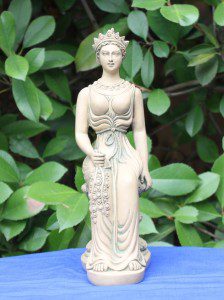 The TV show presented Hera as a prototypical wicked stepmother. But the ancient story is more complex. Yes, Hera was jealous of her husband’s philandering and often struck out against Herakles, a product of one of Zeus’ many affairs. But had she not done so, Herakles would have lived and died as a mortal. He would have never become a great hero, and he would never had become a God.
The TV show presented Hera as a prototypical wicked stepmother. But the ancient story is more complex. Yes, Hera was jealous of her husband’s philandering and often struck out against Herakles, a product of one of Zeus’ many affairs. But had she not done so, Herakles would have lived and died as a mortal. He would have never become a great hero, and he would never had become a God.
Hear our prayers, O Hera, noble Queen of Heaven. Let us find strength and understanding in our hardships, let us see through the smoke and realize the clarity and wisdom in our struggles. Let us always strive to face them nobly, resolutely, and courageously, never to shirk from our duties.
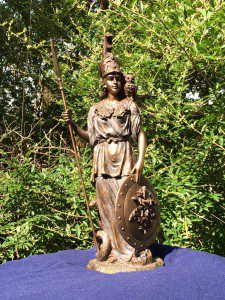 Athena was Herakles’ half sister, and she supported him throughout his great Labors and his other trials. She offered her wisdom and support, but not her assistance, allowing Herakles to complete his tasks on his own merit.
Athena was Herakles’ half sister, and she supported him throughout his great Labors and his other trials. She offered her wisdom and support, but not her assistance, allowing Herakles to complete his tasks on his own merit.
Hear our prayers, O Athena, Grey-Eyed Maiden. We ask for gentle support in the challenges that life brings to us, we ask to remember that we are never truly alone, for our ancestors walk besides us and our gods have long memories, and we ask for the wisdom necessary to rise to our challenges and do what must be done.
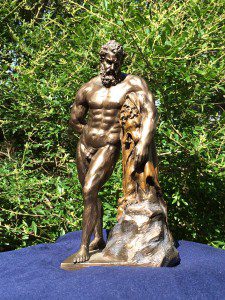 The story of Herakles is one of terrible tragedy and hard-earned redemption. It is one filled with pain and hope. It is a story about doing what must be done, and it is a story about humanity, for we all suffer tragedy, joy, sorrow, and set-backs; triumph and defeat. We are all struggling and fighting to reach our highest potential. The story of Herakles is the story of what it means to be human. Only the details differ.
The story of Herakles is one of terrible tragedy and hard-earned redemption. It is one filled with pain and hope. It is a story about doing what must be done, and it is a story about humanity, for we all suffer tragedy, joy, sorrow, and set-backs; triumph and defeat. We are all struggling and fighting to reach our highest potential. The story of Herakles is the story of what it means to be human. Only the details differ.
Hear our prayers, O Herakles, Mighty Friend of Man! Your strength and perseverance inspire us, your story is the story of every man, woman and child. Let us remember our own strength. Grant us endurance, fortitude, dedication, and the ability to see all tasks through to their completion.
If we had all day, and a place to sacrifice a bull, and a pit big enough to cook it properly, and a throng of priests, singers, champions and worshippers, we could have done a more historically accurate Herakleia. Instead, we used a guided meditation to give people a look at what an ancient celebration might have been like, then ended it with a procession into our own Temple of Herakles. We purified ourselves with water and made offerings to Hestia. We made offerings to Hera, Athena, and Herakles. We told his story.
We gave our participants the opportunity to pray to the Gods at their altars. We made our offerings, and we received their blessings. We thanked them for their presence, and we ended our rite.
This was not a ritual designed to facilitate an ecstatic experience, nor was it designed to work magic toward some desired goal. Rather, it was designed to honor Hestia, Hera, Athena, and Herakles, and to present the story of Herakles to some folks who knew him only as a character from movies and TV.
The restoration continues.


